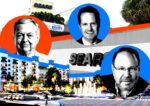Trending
Flipped off: The inside story of Coca-Cola’s botched building sale
Buyer resold 711 Fifth Avenue to rejected bidder for tens of millions more
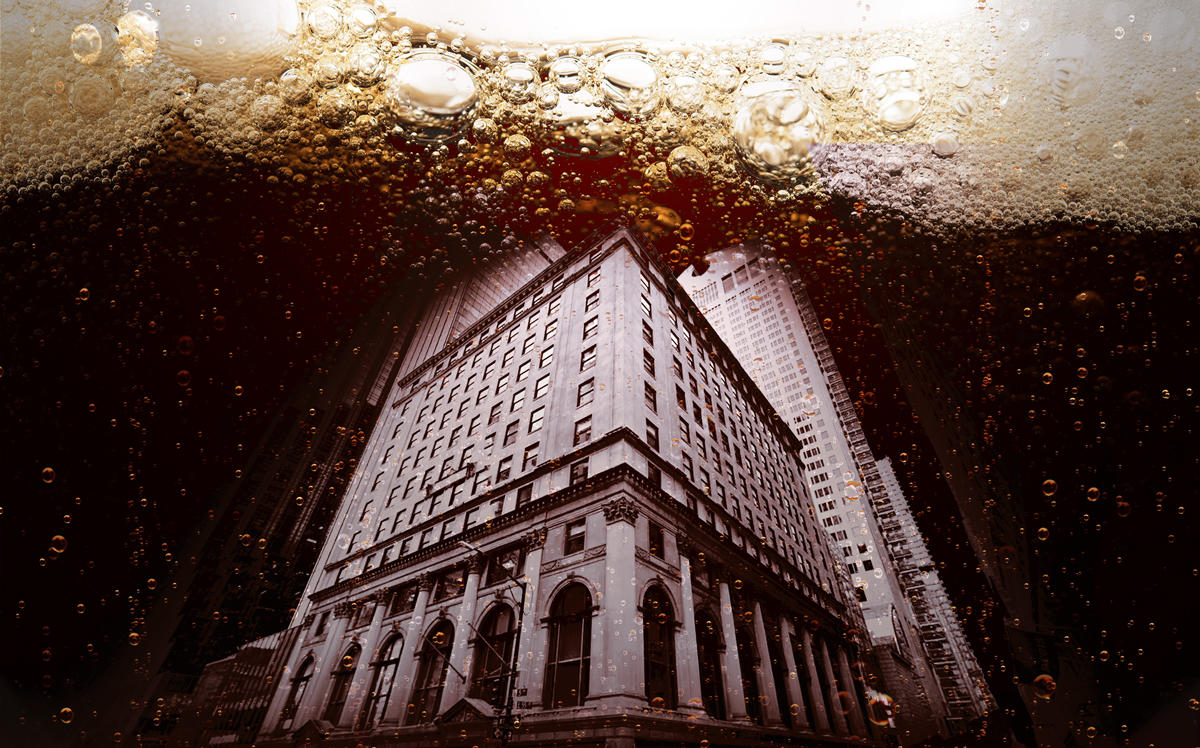
UPDATED, Oct. 10, 2019, 1:44 p.m: Coca-Cola’s real estate division must be feeling flat.
The soft-drink giant had sold its iconic building at 711 Fifth Avenue in August to Nightingale Properties and Wafra Capital Partners for $909 million. But last month, in an unusual twist, Wafra sold its stake in a deal valuing the property at $937 million.
Coca-Cola had left tens of millions of dollars on the table. Making matters worse, the new buyer was an investment group led by controversial investor Michael Shvo — whose even higher offer of $955 million had been dismissed by the beverage maker months earlier.

Michael Shvo
The Shvo group’s purchase was one of the largest flips of a New York building in recent memory and a rare example of a trophy property changing hands quickly after a sale. It also raised doubts about whether Coca-Cola lived up to its fiduciary duty.
“The company has the obligation to shareholders to sell at the highest price,” said Ali Dibaj, an analyst with Sanford C. Bernstein & Co. who covers Coca-Cola, while acknowledging that factors such as timing, financing, terms and reputational risk can affect a sale.
Coca-Cola’s choice of the lower bid looked especially dubious when Nightingale’s partnership failed to line up debt to finance the purchase and sued Coca-Cola to get out of it. Then, as the parties pushed on with the sale, sources say, Nightingale separately arranged to flip the building to Shvo — a final insult to the Fortune 500 company.
In interviews with The Real Deal, a dozen people familiar with the matter pointed fingers in several directions. Some said Coca-Cola was leery of the high bidder because Shvo had pleaded guilty to tax fraud in 2018. Others claimed that an influential tenant opposed Shvo’s offer, fearing eviction if he converted the building to a hotel.
The outcome also raised questions about brokerage Cushman & Wakefield, given that the deal went south and that the brokerage represented the seller, Coca-Cola, while also advising the buyer, Nightingale, on another part of the transaction.
We believe fully that the company has the obligation to shareholders to sell at the highest price. — Ali Dibadj, Coca-Cola analyst
Cushman would not say what advice it gave Coca-Cola but alluded to the company’s wariness of the Shvo bid.
“Coca-Cola is one of the largest and most reputable companies in the world,” the brokerage said via email. “They would not choose to do business with anybody with a less than stellar reputation or track record.”
But Morris Missry, an attorney for the Shvo partnership, said correspondence from the seller tells a different story. “Throughout the entire process of the sale of 711 5th Ave., the Coca-Cola company directly and through its agents reached out to representatives of Michael Shvo and the partnership he leads,” he said in a statement.
Coca-Cola and Shvo declined to comment. Nightingale, which now is property manager of the building, did not respond to requests for comment.
The saga has prompted intrigue in the New York real estate industry. Some say Nightingale’s bid — even at nearly $50 million less than Shvo’s initial offering — was still significantly higher than offers by other parties.
“Value is in the eye of the beholder,” said Jon Mechanic, chair of the real estate practice at Fried Frank. “There are a lot of people you and I both know and respect who would not have paid the price that was being paid by the group that ultimately purchased it.”
An opportunity overlooked
Once home to orchestra performances and the headquarters of NBC, 711 Fifth Avenue has been a hallmark address for nine decades. It takes up half a block on perhaps the most expensive retail strip in the world and its office floors are home to prestigious tenants including asset manager Sandler Capital Management and investment bank Allen & Company, whose former president and CEO is a Coca-Cola board member.
The beverage conglomerate acquired the 15-story building in 1983 when it purchased Columbia Pictures, which owned the property. It had toyed with selling it in recent years, but in December began seriously looking for a buyer after determining it wasn’t needed for its New York operations.
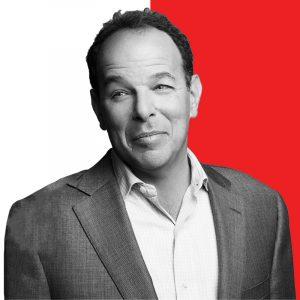
Cushman & Wakefield’s Doug Harmon
Coca-Cola tapped a Cushman team led by heavyweights Doug Harmon and Adam Spies to market the building. Bids came rolling in. According to people familiar with the matter, RFR Holding and Vornado Realty Trust submitted separate offers, one as low as $700 million. (Both firms declined to comment.) By April, two higher bids were on the table: $907 million from a Nightingale-led group and $955 million from Shvo and his partners.

Cushman & Wakefield’s Adam Spies
Shvo is an Israeli broker-turned-developer whose eponymous firm is known for buying legacy buildings in New York — and paying top dollar. At 125 Greenwich Street, a residential development Downtown, he paid $100 million more than the site had sold for two years prior, in 2012. On Fifth Avenue, he and Russian billionaire Vladislav Doronin purchased the upper floors of the Crown building for $475 million in 2015.
Shvo’s indictment on tax charges the following year brought his run as a luxury developer to an abrupt halt. But since resolving the tax case last year he’s made a rapid comeback. Shvo assembled an investment-development team consisting of Turkish developer Bilgili Holding, private equity firm Deutsche Finance America and German pension fund Bayerische Versorgungskammer (BVK) that acquired five properties for $2.8 billion in New York, Los Angeles and Miami.
The Coca-Cola building would have been a crown jewel in the portfolio. Yet despite Shvo’s higher offer, Coca-Cola went with Nightingale.
“It’s puzzling,” said Jay Neveloff, chair of real estate at Kramer Levin, who was not involved in the deal. He allowed that a seller will sometimes choose a lower bid if “the brokerage team feels a higher certainty that the buyer will close.”
But the sale would be anything but smooth.
Nightingale, led by Brooklyn natives Elie Schwartz and Simon Singer, put together an investment team that included longtime financial backer Wafra Capital Partners, a subsidiary of Kuwait’s sovereign wealth fund. The investors put down a $50 million deposit on 711 Fifth Avenue with a commitment to close the deal by the end of June.
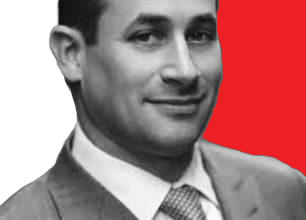
Nightingale’s Elie Schwartz
They also agreed to an anti-flip provision — a common clause that prevents the bidder from earning a commission by offloading a contract to a third party.
Nightingale’s partners brought in a separate Cushman capital-markets team led by Gideon Gil and Rob Rubano for advice on lining up a debt package. That led to Natixis, a French bank, agreeing to lend $775 million — a hefty 85 percent of the purchase price, increasing the risk of the deal. Natixis did not respond to a request for comment.
Cushman’s involvement on both sides of a transaction was not unusual among full-service firms. But when Coca-Cola took the much lower bid, Cushman’s dual role raised eyebrows — especially once the deal started falling apart.
As the closing date drew near, Natixis withdrew from the transaction for undisclosed reasons. Then Nightingale and its partners defaulted on the deal and on June 28 sued Coca-Cola for breach of contract, claiming the company failed to disclose a detail about a tenant agreement.
With its sale botched and the lower bidder about to drag it into litigation, the beverage maker received an intriguing letter: BVK, the German pension fund behind Shvo’s offer, reiterated its $955 million offer. It even committed to keeping 711 Fifth Avenue as an office property to allay any tenant concerns that the building would be converted to a hotel.
“I can suspect that you and your colleagues would like a quick solution to the sale of this property,” wrote BVK’s head of real estate investment management in the letter, a copy of which was obtained by TRD. “We are ready to work with you around any legal issues that have arisen from this prospective buyer’s suit.”
Coca-Cola ignored the overture. Instead, it reached an agreement with Nightingale and Wafra to claim the $50 million deposit and allow the buyer 45 days to line up a new debt partner. Nightingale withdrew its lawsuit.
As Nightingale and Wafra pursued financing under guidance from Cushman, they considered another option.
According to two people with knowledge of the matter, Shvo approached Nightingale’s Schwartz through an intermediary with an offer to buy the property. But the anti-flip provision forbid Nightingale and Wafra from quickly reselling it to Shvo.
So they engineered a workaround: Shvo and his partners would buy Wafra’s majority interest in the purchasing entity.
Nightingale and Wafra closed on the Coca-Cola building at the end of August, financed by a $700 million six-month-term bridge loan from JPMorgan.
Four weeks later, Shvo’s partner BVK executed the workaround. It purchased Wafra’s majority interest, according to a spokesperson for Wafra, who declined to address why Wafra flipped its stake. Nightingale agreed to remain property manager of the building.
Coca-Cola’s choice
The drama prompted speculation about why Coca-Cola chose a lower offer that proved problematic over one from Shvo that in retrospect was viable.
Two people familiar with the matter said Coca-Cola had spurned Shvo out of concern for its reputation. But emails reviewed by TRD indicate that Shvo and his partners were seen by Cushman as legitimate suitors.
“We will send you a contract in a form that our client feels should be executable,” Spies wrote on April 29 to an attorney representing Shvo. (TRD obtained the draft contract sent to the Shvo team.) In other messages, Cushman brokers ask colleagues at the firm to contact Shvo about retaining them to arrange debt for the acquisition. Even after the Shvo bid was rejected, they invited Shvo’s partnership to provide debt for the winning bid.
After the Shvo bid was rejected, Cushman invited Shvo’s partnership to provide debt for the winning bid.
Two other sources attributed Shvo’s rejection to lobbying by Allen & Company — a major tenant of 711 Fifth Avenue with a former CEO on Coca-Cola’s board. The sources said Allen cited Shvo’s history of converting properties to hotels and the potential for it to be kicked out of the building. Allen & Company did not respond to requests for comment.
Veterans of the city’s real estate industry also suggested a possible factor that is often present, if unspoken, in negotiations: One bidder can be more appealing to brokerages than others because of its potential for future business. Nightingale hires brokerages more often than Shvo does to sell, lease and finance office properties in the city.
Cushman’s spokesperson declined to comment on that dynamic, and it remains unclear what advice it gave Coca-Cola. Harmon and Spies declined to comment.
A spokesperson for Deutsche Finance America said the ultimate result speaks to its partner’s credibility. “It is because of Michael Shvo’s strong reputation as a top real estate investor that our partnership was able to purchase 711 Fifth Avenue,” the spokesperson said.
On to the next flip
The new owners have been quick to make their mark on the Fifth Avenue building. Hours before news broke of the sale last month, a plaque featuring the logos of Shvo, Bilgili and Deutsche Finance appeared next to the brightly lit entrance.
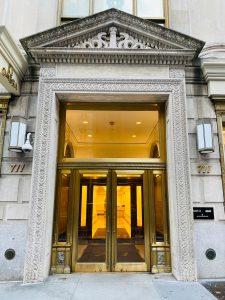
711 Fifth Avenue
BVK, which was omitted from the plaque, provided $400 million in equity to buy Wafra’s stake, valuing the property at $937 million. As part of the deal, the new owners have about four months to pay off the outstanding debt to JPMorgan and secure refinancing.
Nightingale and Wafra, for their part, moved on to another deal. Less than a week after Wafra exited the Coca-Cola building, the duo went into contract on a $570 million purchase of the leasehold interest at 111 Wall Street, a 1.1 million-square-foot building owned by Zurich Insurance Group.
Weeks earlier, another investor had put the property under contract, and now appears to be in discussions to sell the property to Nightingale and Wafra, according to people familiar with the deal.
“It could be a situation,” said Mechanic, “where they’ve gone from being the flipper to the flippee.”
Contact David Jeans at dj@therealdeal.com and Rich Bockmann at rb@therealdeal.com
Correction: The upper floors of the Crown building sold in 2015 for $475 million, not $500 million.




